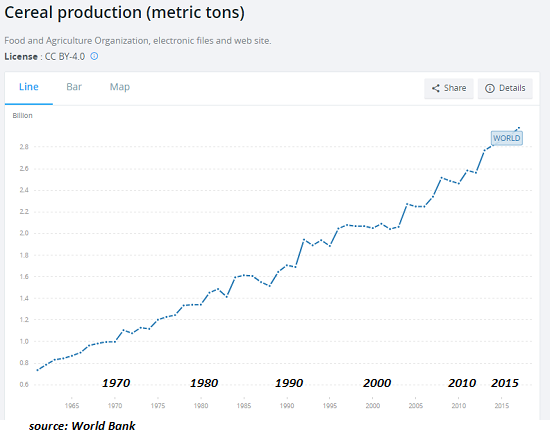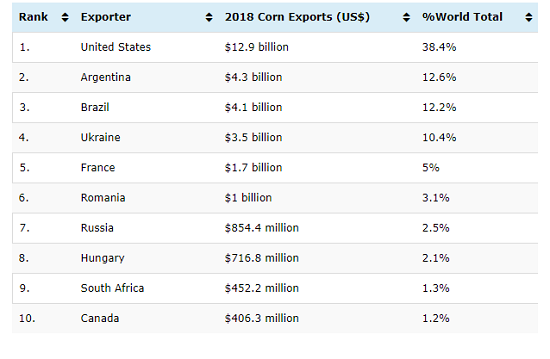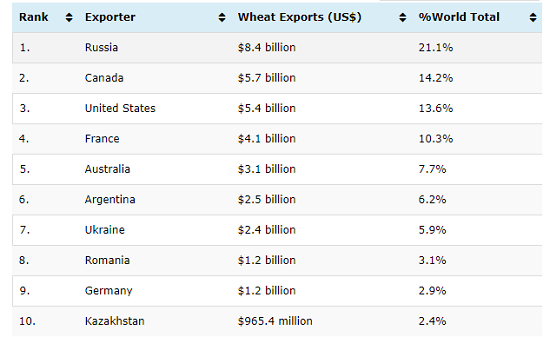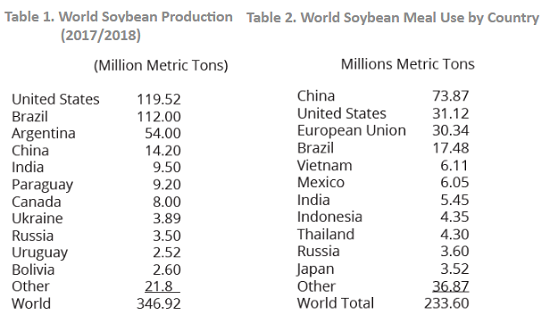The food-exporting superpowers are easy to identify.
Everyone understands extreme weather is a danger to food production. The overuse of antibiotics is less well understood. As this article explains, most antibiotics are given to livestock, which then become breeding grounds for antibiotic-resistant microbes, which are known as superbugs once they develop immunity to all conventional antibiotics.
Almost 80% of all antibiotics in the United States aren’t taken by people. They’re given to cows, pigs, and chickens to make them grow more quickly or as a cheap alternative to keeping them healthy. These drugs could give rise to superbugs—bacteria that can’t be treated with modern medicine—and things are only getting worse. In 2013, more than 131,000 tons of antibiotics were used in food animals worldwide; by 2030, it will be more than 200,000 tons.
Here's the problem with superbugs: you can't kill them with standard-issue antibiotics. They spread like wildfire through monoculture crops and livestock yards and kill with indiscriminate alacrity.
The only solution, poor as it is, is to kill every animal that might be infected--tens of millions or hundreds of millions in the case of African swine fever.
Pigs and chickens are breeding grounds for diseases that jump the low barrier between livestock and humans. So the superbug that starts out killing animals can, with generally modest genetic modifications via variability, start infecting and killing humans with the same alacrity.
While these articles focus on the dangers of superbugs to livestock and humans, superbugs are equally dangerous to cereal and other commodity crops. Blights, fungal pathogens and other plant disease vectors can arise that cannot be controlled by herbicides. Insects undergo genetic modification and become resistant to pesticides. As pesticides become more toxic, more systemic and more ubiquitous, they start killing or weakening the "good" insects global agriculture depends on--the pollinating insects.
Superbugs don't respect national or ideological borders. Every agricultural economy based on monocultures and mass use of antibiotics, pesticides and herbicides is vulnerable to superbugs.
As I've often noted here, centralization itself creates systemic vulnerabilities.A handful of industrial-scale super-farms raising monoculture crops and livestock are exquisitely vulnerable to the rise of superbugs. A thousand smaller farms and livestock operations that manage diseases without antibiotics and chemicals are more resilient, just as matter of distance from each other and the variability of genetic lineages in their crops and livestock.
As many others have pointed out, oil and food production are now essentially one system: industrial-scale agriculture depends on industrial fuels and petrochemical fertilizers; no oil and natural gas, no food.
But we can't eat oil. A nation might have the financial means to buy energy or be blessed with energy resources within its borders, but if superbugs wipe out much of its cereal and other commodity crops and its livestock, its people will go hungry.
And hungry people topple governments. Governments can lie about all sorts of statistics such as unemployment, GDP, inflation and so on, but a government that claims food is abundant when it is actually scarce is a government on its way to the dustbin of history.
The Bastille was torn down by a raging mob in Paris as bread prices skyrocketed beyond the reach of the poor.
So let's project what happens when some nations don't have enough food and others manage to have a surplus. Food becomes the ultimate economic weapon, as long as there's still enough energy to transport it from exporter to importer and distribute it to the hungry mobs.
As this chart from the World Bank shows, the world has enjoyed steadily increasing yields of cereals. Nobody expects a decline back to the levels of 20 years ago, but extreme weather and a handful of superbugs could very quickly reverse this upward trend.
The majority of many commodity crops feed livestock, not humans, and as a general rule it take five or more kilos of grain to produce one kilo of meat. No corn and soybeans, no meat.
Wheat and rice are staples of the human diet, and the exportable surpluses of wheat are concentrated in a few hands.
The same is true of soybeans, a source of protein in Asia and livestock feed everywhere. This chart shows the top producers and the top consumers.
The asymmetry between exporters and importers delineates the power implicit in food. Those with surpluses to sell hold power over those who need the surpluses to feed their restive, hungry populations.
The food-exporting superpowers are easy to identify: The U.S., Russia, Ukraine, France, Brazil, Argentina, Canada, and weather permitting, Australia. This reduces down to three superpower regions: North America at the top, Russia and Ukraine, and Brazil and Argentina, with France replacing Germany as the continental superpower once food matters.
As for rice, the top exporters are India, Thailand and Vietnam. Recalibrate their potential power in the era of food scarcity accordingly.
NOTE: Contributions/subscriptions are acknowledged in the order received. Your name and email remain confidential and will not be given to any other individual, company or agency.
| |
Thank you, John V. ($5/month), for your superbly generous pledge to this site-- I am greatly honored by your steadfast support and readership.
| |






























